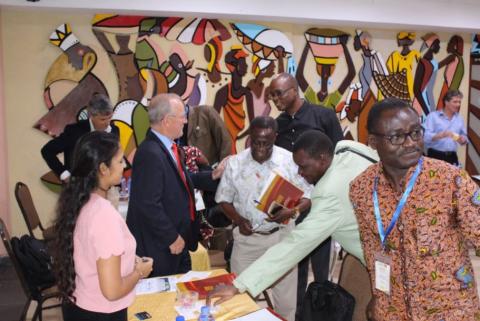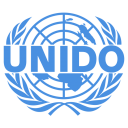SOLAR COMPANIES GATHER TO EXPLORE BUSINESS OPPORTUNITIES IN THE SOLAR OFF-GRID MARKET
Accra, June 25 – The ECOWAS Centre for Renewable Energy and Energy Efficiency (ECREEE), through its Regional Off-Grid Electrification Project (ROGEP), held the first edition of the Business-to-Business (B2B) networking event, bringing together companies from the solar off-grid industry.
The B2B event aims to provide a networking platform for regional entrepreneurs and their international counterparts in order to facilitate knowledge transfer, business deals and collaboration. The event was held at the back-end of the training workshop on pay-as-you-go (PAYGO) technology and business models for 35 entrepreneurs from 19 countries. In order to achieve higher uptake sustainable energy usage in rural areas.
The B2B event is part of a series of activities under ROGEP’s Private Sector Support Facility, supported by the World Bank and its Lighting Africa Program. The Facility aims to remove barriers and create an enabling environment for the private sector on order to scale-up the uptake for off-grid solar solutions such as solar pico-solar, solar home systems (SHS), irrigation, water pumping, etc.
The B2B gathering provided the both local and international companies a unique opportunity to network, interact and explore some of the tremendous prospects offered by the Western Africa market. As, Rick Sheridan from Sunny Irrigation, beautifully put it, “there are not many events where you can have an entrepreneur from Central Africa, Niger, Mauritania, Mali and Togo together at your table”.
Raissa Silue, Business Representative for Barefoot Power, a company manufacturing solar power solutions, said the event had offered her outfit exploratory opportunities for financing mechanisms. Barefoot Power focuses on providing affordable, reliable and extensive range of solar products, lighting and electronic appliances for home and small business, including smart phone charging to off-grid communities in the sub-region.
Mr. Paul Pangni, manager of Yandalux Côte D’Ivoire, a sustainable energy company with a strong representation in the ECOWAS market, also lauded ECREEE for the B2B networking. To him the event was a good platform to establish contacts for potential partnerships to enhance businesses opportunities on solar energy for consumers not connected to the grid, as well as the trade and the agricultural sector.
During the intermission, Mr. Mahama Kappiah, Executive Director of ECREEE gave the participation awards to the 30 participants who took part in the training workshop for entrepreneurs on the PAYGO technologies and last-mile business models. The training, which took place from 20 – 23 June under guidance of trainers from Kenya, a country where the market for the pay-as-you-go as matured. The trainers, namely Mr. Gerald Mwega and Waweru Gichimu provided key insights to the 30+ entrepreneurs on last-mile distribution and pay-as-you-go technologies. On the last day, Mr. Godfrey Mwindaare, who brings extensive experience from banking and investment served as a resource person on Access to finance.
ECREEE, with the support of the World Bank and in collaboration with the ECOWAS Bank for Investment and Development (EBID) and the West African Development Bank (BOAD), is promoting the Regional Off-Grid Electrification Project (ROGEP) to increase access to households, businesses, public institutions and communities using modern standalone solar systems in the 19 project countries. ROGEP, one of ECOWAS Community Development Projects, aims particularly to promote private sector investment with a market-based approach in expanding off-grid electricity access. Lessons from off-grid electrification projects suggests that to successfully attract private sector and to create a sustainable market with economy of scale, transparent policies, business procedures and access to finance are needed.
Several West African and Sahel countries are already in the business of tackling the issue of off-grid electrification to some degree in a wide variety of approaches such as rural electrification agencies, rural electrification funds, leasing, concessions, franchising, among others. Therefore, one of the roles of ROGEP is support the acceleration of these initiatives and develop a common platform for sharing approaches and best practices as well as create a regional capacity to scale up the penetration of solar technology which is required to meet universal access to energy.
The main objective of ROGEP is to enhance shared capacity, institutions and knowledge to jointly increase electricity access to households, businesses and communities using modern standalone solar technologies, for instance solar lanterns, solar home systems, solar water pumps, solar mills, solar sewing machines, in project countries. The project will focus on a selected set of initiatives that are crucial to meeting the regional strategic goals.
ROGEP will achieve this by (i) supporting the acceleration of a regional market of standalone solar equipment; and (ii) facilitating access to finance for companies supplying standalone solar systems for household, public institutions such as schools and hospitals, and productive end-users as well as their customers.





